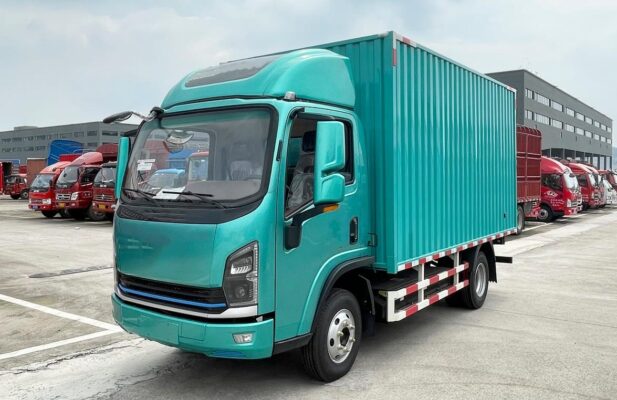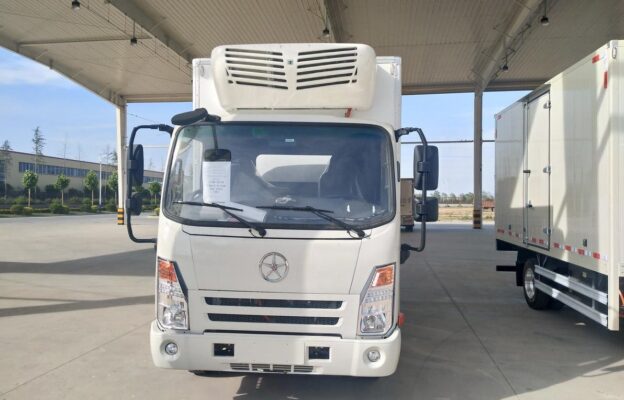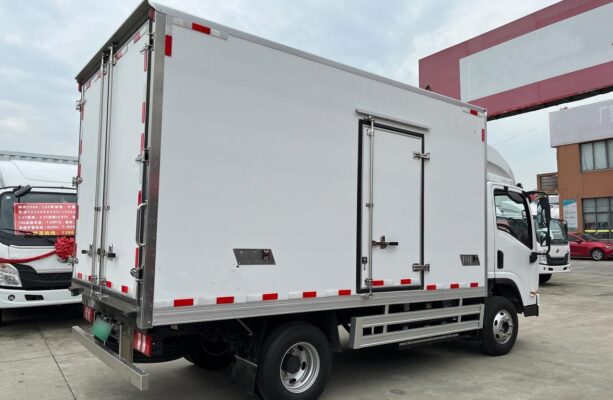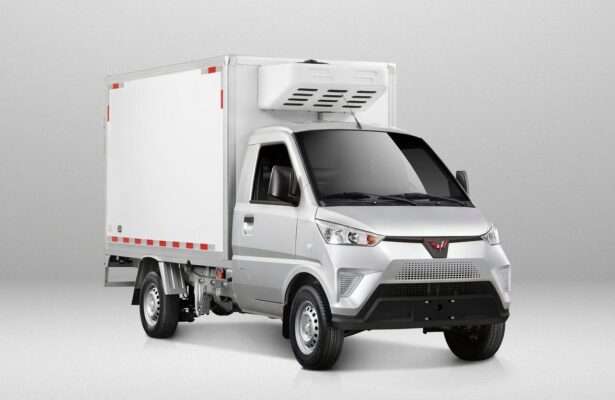Naidheachdan Truck Dealain
What Are Extended-Range Electric Pickup Trucks
Extended-range electric pickup trucks represent a significant evolution in the automotive industry, merging elements of traditional gasoline vehicles with the innovative technology of electric pickups. These vehicles primarily utilize an electric drive system to power their operation but are also equipped with an onboard gasoline generator. This hybrid approach aims to address some of the limitations associated with conventional electric pickups, particularly in terms of range and charging flexibility. In this article, we will explore the features, advantages, disadvantages, market outlook, and development potential of extended-range electric pickup trucks.
1.Understanding Extended-Range Electric Pickup Trucks
Extended-range electric pickup trucks are designed to overcome the inherent range limitations of standard electric vehicles. By incorporating a gasoline generator, these vehicles can generate additional electricity when needed, allowing for longer distances without the need to rely solely on charging stations. The vehicle operates primarily on electric power, ensuring a quieter and more efficient ride while providing the added assurance of a combustion engine to extend travel capability when necessary.
The architecture of an extended-range electric pickup typically includes:
- Electric Drive System: This is the primary source of power, providing the benefits of an electric vehicle, such as instant torque and reduced emissions during normal operation.
- Onboard Gasoline Generator: When the battery charge is low, the generator can start automatically to recharge the battery, ensuring that the vehicle remains operational over longer distances without needing to find a charging station.
- Hybrid Power Management System: This system intelligently manages the distribution of power between the electric drive and the gasoline generator, optimizing efficiency and performance based on driving conditions.
2.Advantages of Extended-Range Electric Pickup Trucks
- Longer Range:
One of the most significant advantages of extended-range electric pickups is their ability to achieve substantially longer driving ranges than traditional electric pickups. The onboard generator can provide additional power to the electric drive system as needed, effectively extending the vehicle’s range beyond that of conventional battery-only electric trucks. This feature is especially beneficial for users who require longer distances for work or travel. - Flexible Charging Options:
Extended-range electric pickups can be charged in various ways, including standard charging stations and through the onboard gasoline generator. This flexibility allows drivers to refuel more conveniently, reducing the anxiety often associated with finding charging stations on long journeys. - Reduced Dependence on Charging Infrastructure:
With the capability to generate electricity on the go, these vehicles alleviate concerns about charging infrastructure availability. When battery levels drop, the generator automatically kicks in, recharging the battery and enabling continued operation without lengthy stops for charging. - Lower Carbon Emissions:
Depending on the fuel used, the generator can operate on more environmentally friendly options such as natural gas or biofuels. This capability can contribute to lower overall carbon emissions compared to traditional gasoline vehicles, making extended-range electric pickups a more eco-friendly choice.
3.Disadvantages of Extended-Range Electric Pickup Trucks
- Higher Cost:
One notable drawback of extended-range electric pickups is their higher manufacturing cost compared to traditional gasoline vehicles and fully electric pickups. The inclusion of an internal combustion engine and the complexities of hybrid technology can lead to elevated retail prices. This higher cost may deter some potential buyers, especially those who are looking for budget-friendly options. - Fuel Consumption and Emissions:
While the primary operation is electric, the gasoline generator can lead to additional fuel consumption and emissions during long drives. When the generator runs continuously for extended periods, it can negate some of the environmental benefits typically associated with electric vehicles, impacting overall fuel economy. - Maintenance Costs:
Extended-range electric pickups generally have higher maintenance costs than fully electric vehicles. This is largely due to the presence of an internal combustion engine, which requires regular maintenance and the replacement of components, such as oil changes and exhaust systems. This added maintenance complexity can increase the overall cost of ownership.
4.Market Outlook for Extended-Range Electric Pickup Trucks
The market outlook for extended-range electric pickups is promising, driven by increasing environmental awareness and ongoing advancements in technology. As consumers seek vehicles that combine the eco-friendliness of electric power with the convenience of longer ranges, extended-range electric pickups offer a compelling solution.
- Consumer Demand:
With growing interest in sustainable transportation options, consumers are looking for vehicles that meet their needs for long-distance driving and convenient charging. Extended-range electric pickups provide the perfect compromise between the benefits of electric driving and the practicality of gasoline-powered vehicles. - Technological Advancements:
Continuous advancements in battery technology, electric drive systems, and hybrid engines are expected to improve the efficiency and performance of extended-range electric pickups. As these technologies mature, the manufacturing costs of these vehicles are likely to decrease, making them more accessible to a broader range of consumers. - Government Support:
Many governments worldwide are promoting eco-friendly transportation options through subsidies, tax incentives, and infrastructure development. This support is likely to enhance the appeal of extended-range electric pickups, further driving their market adoption.
5.Development Outlook for Extended-Range Electric Pickup Trucks
Extended-range electric pickups are positioned as transitional vehicles in the automotive landscape. As battery technology improves and the charging infrastructure expands, fully electric pickups are becoming increasingly viable. Ach, until these advancements are fully realized, extended-range electric pickups will continue to serve as a practical solution for consumers who need long-range capabilities.
- Technological Progress:
As battery technology continues to evolve, the energy density and efficiency of electric systems are improving, narrowing the performance gap between extended-range and fully electric pickups. Innovations in solid-state batteries, for example, may enhance range without necessitating larger battery packs, thereby reducing weight and costs. - Charging Infrastructure:
The expansion of charging infrastructure will play a vital role in determining the market success of both extended-range electric pickups and fully electric pickups. As more charging stations become available, drivers will feel less reliant on onboard generators, making fully electric options more appealing. - Long-Term Transition:
While extended-range electric pickups will likely remain relevant in the near future, the ultimate goal is a transition to fully electric vehicles. As consumer acceptance of electric vehicles grows and concerns about range anxiety diminish, the demand for extended-range models may decrease. Ach, until that point is reached, these hybrid trucks will continue to meet the needs of drivers who require the flexibility to travel longer distances without frequent stops for charging.
6.Differences from Other Vehicle Types
The primary distinction between extended-range electric pickups and other vehicle types lies in their power systems. Extended-range pickups use an electric drive system as their main power source, supplemented by a gasoline generator. This hybrid setup allows for greater flexibility and range compared to traditional gasoline vehicles, which rely solely on fuel combustion for power.
- Versus Traditional Gasoline Vehicles:
Traditional gasoline vehicles are powered entirely by combustion engines, leading to higher fuel consumption and emissions. Extended-range pickups, while still incorporating a combustion engine, operate primarily on electric power, offering better fuel economy and reduced emissions during regular use. - Versus Fully Electric Pickups:
Fully electric pickups rely exclusively on battery power, which can limit their range without access to charging stations. In contrast, extended-range electric pickups combine the advantages of both electric and gasoline power, providing longer ranges and flexible charging options.
Conclusion
Extended-range electric pickup trucks represent a significant advancement in the automotive market, blending the benefits of electric vehicles with the practicality of traditional gasoline-powered trucks. While they offer longer ranges, flexible charging options, and lower carbon emissions, challenges such as higher costs, fuel consumption during long drives, and maintenance complexities remain.
As technology continues to evolve, the market for extended-range electric pickups is expected to grow, driven by consumer demand for environmentally friendly transportation solutions. Ultimately, these vehicles serve as a transitional option in the shift toward fully electric vehicles, helping to bridge the gap between traditional and electric transportation while contributing to the development of a sustainable automotive future.




